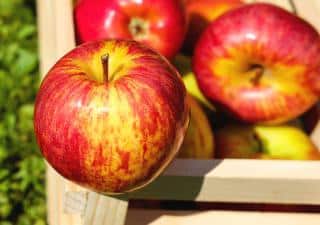

Once upon a time the symbol of the forbidden fruit, apple today is recommended for its many health benefits.
Apples are the fruits of apple trees (Malus domestica), a little fruit tree of the Rosaceae family appreciated for its spring blooming and its simple, light silhouette.
Even though it is full of water, apples are loaded with nutrients and are among the healthiest fruits of our diets. Remember to eat it with its peel, because the peel contains a major portion of the benefits this fruit offers. But first, remember to check that the fruit comes from organic orchards or fields with no pesticides nor synthetic products.
 An apple is replete with vitamins A, B and C, which make it a fruit that reinforces our immune system. These vitamins help our body fight off bacteria and toxins, might help reduce risks of cardiovascular disease and certain cancers, reinforces our skin, tissues and bones.
An apple is replete with vitamins A, B and C, which make it a fruit that reinforces our immune system. These vitamins help our body fight off bacteria and toxins, might help reduce risks of cardiovascular disease and certain cancers, reinforces our skin, tissues and bones. Plant them in cool, well drained soil. Avoid rocky, dry ground that would slow growth and produce apple trees that are weakened when faced with diseases and pests.
Plant them in cool, well drained soil. Avoid rocky, dry ground that would slow growth and produce apple trees that are weakened when faced with diseases and pests.
Apple trees appreciate temperate and sunny areas but they fear high temperatures and moisture.
Note that apple trees are regularly beset with fungal diseases (mushroom related). These tend to wreck severe damage. Examples are:
 The many apple varieties for sale on the market will let you change tastes and flavors while benefiting from their health-bolstering benefits.
The many apple varieties for sale on the market will let you change tastes and flavors while benefiting from their health-bolstering benefits.
Eat them cooked or bite them raw, depending on the season and your mood!
53 kcal / 3.5 oz (100 g). Apples boast high vitamin C, B and E levels. It also incorporates many minerals and trace elements. It also has very high levels of fiber.